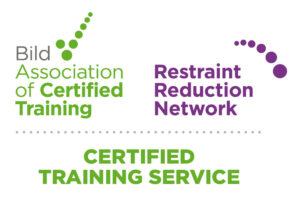Positive Behaviour Support Training
RRN certificated training provider delivering award winning Positive Behaviour Support (PBS) training programmes
Our PBS Training looks at the Quality of life for the people we support. Our training covers all aspects of the PBS Framework and PBS Standards. The PBS training covers things such as active support, communication and relationship building. Our team is an RRN certificated training provider, our team consists of qualified BILD PBS coaches.
If you would like to discuss a course, please contact: PBS.Team@st-annes.org.uk or call 0113 243 5151

- Why choose us
- About St Anne's PBS
- Our courses
- Case Studies
- Our team
- What is PBS and what components make up a successful PBS approach?
- The concept of behaviour?
- Why do we sometimes behave in challenging ways?
- All behaviours have a function and communicative intent. How do we analyse what these might be.
- Primary, Secondary, Tertiary and Recovery Strategies.
- Improving quality of life to decrease challenging behaviour proactively.
- Ethical working, values attitudes and beliefs
- Self management and self control. What impact does our own behaviour have on those we support?
- What is PBS and what components make up a successful PBS approach?
- The concept of behaviour?
- Why do we sometimes behave in challenging ways?
- All behaviours have a function and communicative intent. How do we analyse what these might be.
- Primary, Secondary, Tertiary and Recovery Strategies.
- Improving quality of life to decrease challenging behaviour proactively.
- Ethical working, values attitudes and beliefs
- Self management and self control. What impact does our own behaviour have on those we support?
- The law and points to consider when responding to behaviours of concern.
- Current National Legislation and guidance.
- Health and Safety during and after hands on interventions.
- Keeping safe – breakaway techniques.
- Good recording and reporting skills.
Our training is driven and motivated by a strong value base.
Our PBS Team are passionate about improving the lives of others and supporting teams to have the skills to make measurable differences for their clients.
The team provide award winning Positive Behaviour Support (PBS) training programmes centred around evidence-based procedures. St Anne’s PBS training is RRN Certified (Restraint Reduction Network).
All our training courses can be adapted to meet the needs of different client groups or made bespoke for an individual.
Our training courses are delivered by working clinicians with current experience in applied settings, and can be provided at a venue of your choice.
To discover more about our courses, please see our brochure: PBS Brochure 2024

Our training model
Our PBS Training model delivers the highest quality elements. The aim of the work is to support teams to equip their clients with the necessary skills to live a good quality of life, have their needs met and avoid escalation. We use non aversive techniques focussing on the least restricting interventions. Any hands on interventions will be taught on a needs basis and as a last resort.
Our standard package is structured around the research and theory of the escalation cycle as described briefly below.
Primary: planning, audits, analysis, Quality of Life, Skill teaching, communication, environment, risk assessments.
Secondary: de-escalation, diffusion, distractions and self-management.
Tertiary: non aversive interventions, least restrictive practice which may include bespoke breakaways and RRN certificated physical interventions.
Recovery: recovery, post incident report, stress management, reporting and recording, data collection.
Our trainers are certified to deliver training to teams who support adults and children and all our training packages can be made bespoke to meet the needs of individual client groups.

St Anne’s PBS training has BILDACT certification to the Restraint Reduction Network Standards 2019
Our primary courses are readily adapted or can be made bespoke to meet the needs of individualised teams including focus on either adults or children with learning disabilities, autism, mental health diagnosis, dementia. We also offer support training to staff who are regularly lone working. Many of our courses can also be delivered virtually.
Option 1 – St Anne’s RRN Pathway -Introduction to PBS Theory
A one day course designed for new starters or less experienced staff who work in challenging environments
The course covers:
Option 2 – St Anne’s RRN Pathway – PBS Theory Plus Breakaway Techniques
A one day course designed for staff who work in challenging environments and may need extra techniques to keep safe.
This course covers:
Option 3 – St Anne’s RRN Pathway – PBS Theory Plus Breakaway Techniques and Bespoke Physical Interventions
This course is a two day course for staff working in an highly challenging environment.
The aim of this course is to emphasise the need for staff to reduce the use of restrictive interventions. This is achieved by completing 12 hours intensive theory prior to any restrictive intervention technique training. A training needs analysis (TNA) will be used to develop each individual course to best suit the needs of the service and the client they support. Candidates will learn:
Day 1
Session one – Participants consider What is challenging behaviour and how can PBS support it within the context of a Human Rights based approach.
Session two – Participants explore Person Centred Planning, and risk assessments to enable positive risk taking based around Duty of Care and Best Interest.
Session three – Participants undertake Behavioural analysis and functional assessment in order to determine why people may challenge and what function the identified behaviours support.
Session four – Candidates review Legislation and best practice around the use of restrictive interventions. Overview of national and local legislation and how it effects organizational policy and procedure.
Day 2
Session one – Participants undertake an in-depth planning and behavioural assessment session building on the Day 1 session to develop a plan specific to the needs of the client and the service.
Session two – Participants learn de-escalation, distraction and diffusion theory and techniques which incorporates an approach that promotes self-awareness, self-management and reflection.
Session three – Participants explore Theory of tertiary strategies and managing trauma including theory elements of non-aversive interventions, Breakaway techniques and physical intervention. Ethical working practice, use of self-reflection, the application of sound values attitudes and beliefs.
Session four – Candidates consider Post incident support and recovery strategies. Reporting and Recording, debrief and reflective learning.
Day 2 also consists of the practical skill training relating to the required skillset as identified by the Training Needs Analysis. This may include several Breakaway or Restrictive Physical Interventions – The timescale for this will be determined by the TNA and the level of restriction required.
All Breakaway and Physical interventions are approved through the RRN Certification and are taught in line with the ethical and legal considerations of the use and implementation of the techniques and always with the view to reduce the need for physical intervention, restrictive practice and restraint.
St Anne’s RRN Refresher/Update’
This course is a one day course to be completed each year after completing the initial one or 2 day introduction.
Our refresher course is a recap of those skills learnt during the Introduction. We update our refresher regular to include new and up to date content.
Case Studies
Durham 2018
St Anne’s began working with person X over 10 years ago, the service was shaped around what the person needed. Today person X remains central to everything we do to support him and enable him to lead a purposeful life that meets his needs.
Person X may sometimes be hard to engage with and challenges our support. For person X the St Anne’s Positive Behavioural Support (PBS) model delivered the highest quality outcomes, providing primary, proactive, secondary, reactive and recovery strategies through training, development and consultation.
St Anne’s PBS programmes take a wide holistic approach. We have provided a diverse range of options, including, leadership of the team, trauma and mental health support, personal awareness, stress management and safety.
Our approach is based on working with the person themselves, wherever possible, and those who support them to understand the function of their behaviours. By understanding the function of behaviours enables us to create ways to support person X to communicate their needs and wishes in different ways with less reliance on environmental destruction, self-injury and violence and aggression.

Our work with person X demonstrates though that to be truly person centred we must take a long view and understand that the person we support today is influenced by their whole life experiences.
We have had to work hard to enable the team supporting person X to understand why he communicates his feelings in the way he does and that true person centredness for person X can be counter intuitive to ways others communicate and to ensure person X feels safe plans must be followed and learning shared. Staff new to supporting person X can feel that using the minimal verbal communication, person X prefers is less social than they might expect but to respect person X his preferences must be observed.
Through our work we have positively changed the live of this once vulnerable person, hugely reducing the use of restrictive practice in their life. More broadly our innovative approaches succeed with young people, adults and in older people’s services.
We have seen huge sustained, positive changes in person X, these positive changes continue to develop. He has not needed to return to hospital and now accesses the community, lives on his own (with staff support). He continues to have a strong relationship with his family and minimum restrictions in place across the responsive spectrum.

Stephen Allen – PBS Trainer
![]()
Stephen has over 11 years’ experience of working with children with disabilities, this followed a period of outreach work with mainstream children and 3 years of working in a pupil referral unit. Stephen is also studying BSc Psychology alongside full-time work. Stephen discovered a passion for Positive Behaviour Support after implementing proactive strategies for the children he worked with after seeing that the previous model of support focussed heavily on reactive strategies. This led to some research into PBS and Stephen attending a conference to learn more, which provided knowledge around further aspects, such as functional assessments. Stephen is excited about the future of PBS and looks forward to broadening his knowledge and experience to support others to be able to live life to their full potential. Stephen has delivered training in a positive behaviour management model for 4 years across Local Authority Residential homes.
Stephen joined St Anne’s in 2020 and is involved in training PBS with a hope to support staff to equip the adults they work with, with the tools to self-regulate their own behaviours with minimal staff intervention.
Mathew Jones – PBS Practitioner
![]()
After completing his BSc Psychology (Hons) Matthew joined St Anne’s in 2012. Since then, Matthew has supported individuals in a variety of support settings across Leeds, Kirklees, Calderdale, and Bradford including outreach, supported living and residential services and management roles.
Matthew joined the Positive Behaviour Support team in 2015 following his involvement in a newly established forensic mental health service. This then led to his involvement in the development of support plans and bespoke training around significant self-harming behaviours and played a key role in the work that culminated in the receipt of the Special Award for Outstanding Practice at the BILD 2017 Leadership Awards.
Matthew was involved in the application for certification under the Restraint Reduction Network and the initial development of the training model to meet these standards. Matthew is excited about the continued development within the field and further progression and advancement within training to best support the teams we work with and the individuals they support.

PBS - enabling a better quality of life
Our PBS team won the best “Video Poster” at the IPBS “Bild” Conference 2021. The video shows the benefits of PBS, and the support it provides to people to enable them to have a better quality of life.
Click Here

